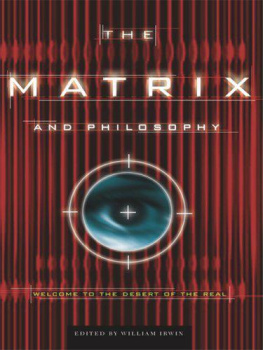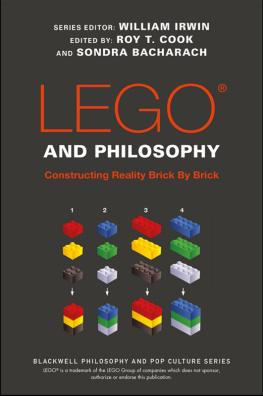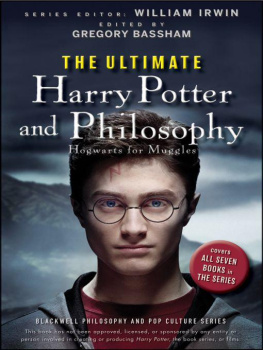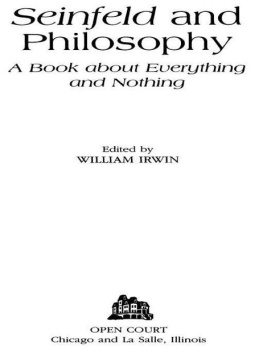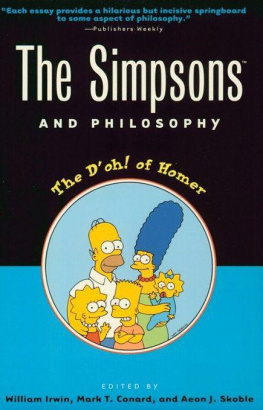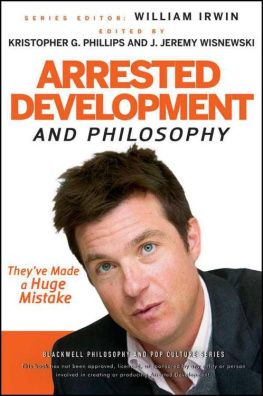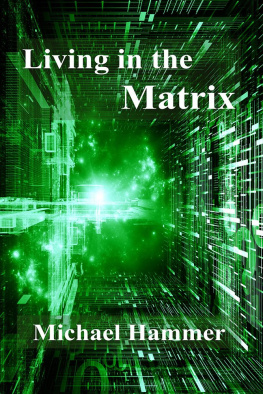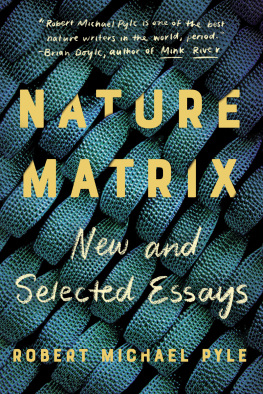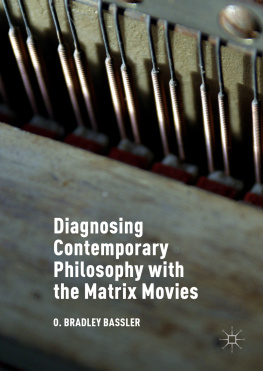
The Matrix and Philosophy
Welcome to the Desert of the Real
Edited by
WILLIAM IRWIN

For Peter H. Hare,
Morpheus to many
Contents
Scene 1
1.
WILLIAM IRWIN
2.
GERALD J. ERION and BARRY SMITH
3.
DAVID MITSUO NIXON
4.
CAROLYN KORSMEYER
Scene 2
5.
JORGE J.E. GRACIA and JONATHAN J. SANFORD
6.
JASON HOLT
7.
DANIEL BARWICK
8.
THEODORE SCHICK, Jr.
Scene 3
9.
MICHAEL BRANNIGAN
10.
GREGORY BASSHAM
11.
CHARLES L. GRISWOLD, Jr.
12.
JAMES LAWLER
Scene 4
13.
THOMAS S. HIBBS
14.
JENNIFER L. McMAHON
15.
SARAH E. WORTH
16.
DEBORAH KNIGHT and GEORGE McKNIGHT
Scene 5
17.
CYNTHIA FREELAND
18.
MARTIN A. DANAHAY AND DAVID RIEDER
19.
DAVID WEBERMAN
20.
SLAVOJ ZIZEK
Introduction:
Meditations on The Matrix
Which pill would you choose, the red or the blue? Is ignorance bliss, or is the truth worth knowing, no matter what? After watching The Matrix we are impressed by the action and special effects, and also besieged by questions. Is it possible that we ourselves are prisoners of the Matrix? Is this a Christian film? A Buddhist film? There is no spoon?
A student of mine at Kings College, Adam Albert, first drew my attention to The Matrix . He immediately saw the connections between the film and Descartess speculations on the possibility of deception by dreams or an evil deceiver. My experience and his were similar to those of philosophy professors and students around the world. The magazine Philosophy Now even held an essay contest for college students. The topic: Which pill would you choose? Why?
With this book, professors follow the trail blazed by their students. Each author asks and answers questions about the philosophical significance of the film. As culture critic Slavoj Zizek suggests, The Matrix is a philosophers Rorschach inkblot test. Philosophers see their favored philosophy in it: existentialism, Marxism, feminism, Buddhism, nihilism, postmodernism. Name your philosophical ism and you can find it in The Matrix . Still, the film is not just some randomly generated inkblot but has a definite plan behind it and intentionally incorporates much that is philosophical. The Wachowski brothers, college dropout comic-book artists intrigued by the Big Questions, readily acknowledge that they have woven many philosophical themes and allusions into the fabric of the film. The Matrix and Philosophy does not in every instance attempt or purport to convey the intended meaning of the writers and artists responsible for The Matrix . Rather, the book highlights the philosophical significance of the film.
To paraphrase Trinity, its the questions that drive us. The contributing authors draw on Plato, Aristotle, Aquinas, Descartes, Kant, Nietzsche, Sartre, Sellars, Nozick, Baudrillard, and Quine (among other philosophers) to address the questions: What can I know? What should I do? What may I hope? What is real? What is happiness? What is the mind? What is freedom, and do we have it? Is artificial intelligence possible? Answering these questions leads us to explore many of the major branches of philosophy including metaphysics, epistemology, ethics, aesthetics, philosophy of mind, philosophy of religion, and political philosophy. Despite the multitude of questions, there is but one imperative: WAKE UP!
People like popular culture; it is the common language of our time. Did you know that Aaliyah died before completing the sequel to The Matrix ? Did you know that W.V. Quine died less than a year before that? Many people know about the pop star, Aaliyah, while most people have never even heard of the great philosopher, Quine. The contributing authors of this book aim to bring the reader from pop culture to philosophy. Willie Sutton was a criminal mastermind, a genius of sorts. Once asked, Willie, why do you rob banks? he replied straightforwardly, Because thats where the money is. Why write about pop culture like The Matrix ? Because thats where the people are.
No one would object if we turned to the works of Homer, Dante, and Shakespeare to raise philosophical questions. The Matrix does not belong to the list of Western classics, but nevertheless the film raises the same philosophical questions as the great works of literature. If philosophy could be found only in the writing of philosophers and were relevant only to the lives of professors, then it would be the dull and sterile discipline too many people mistakenly believe it to be. But philosophy is everywhere; it is relevant to and can illuminate everyones life; like the Matrix, it is all around us.
This book is not just for philosophers but for all of us who have ever had a splinter in the mind, driving us mad. Let it be a beginning but by no means an end to your study of philosophy.
Scene 1
How Do You Know?
Computers, Caves, and Oracles: Neo and Socrates
WILLIAM IRWIN
I tell them that Im doing fine
Watching shadows on the wall.
JOHN LENNON
So often times it happens that we live our lives in chains
And we never even know we have the key.
THE EAGLES
Many people recognize The Matrix as a retelling of the greatest story ever told. The biblical imagery is clear, and the films release on Easter weekend 1999 supports the intent. Few people recognize The Matrix as a retelling of the greatest story never told, the story of Socrates, an intellectual hero who continued on his quest despite opposition and ultimately paid for his noble defiance with his life.
Why dont most people know one of the greatest stories our culture has to offer? The main reason is that we leave the job of telling the story to college philosophy professors. Not everyone attends college and, sadly, not everyone who attends college takes a philosophy course. While Philosophy 101 is an ideal setting in which to study closely and discuss passionately the life of Socrates, theres no need to wait for an opportunity that may never come. Like the story of Jesus, the story of Socrates should be the subject of childrens books, family and classroom discussions, and TV specials. There should be a movie about it. The Wachowski brothers directed Keanu Reeves in a veiled telling of the tale, but I would cast Steve Martin as the lead in an unapologetic Socrates cinematic celebration. Spielberg would direct. The Matrix is many things; a retelling of the Socrates story is just one of them, and indeed viewers are certain to miss this element of the film unless they already know the story. If youre unfamiliar with the tale, let this essay be your introduction.
Questions and Missions
Were on a mission from God, said the Blues Brothers. They had a full tank of gas, half a pack of cigarettes, and one hundred and six miles to Chicago. It was dark and they were wearing sunglasses. Their mission? Play a concert to save the orphanage in which they were raised by an old school nun, affectionately called the penguin. Neo is on a mission to save the human race from unwitting enslavement to artificial intelligence. Socrates too is on a mission, a mission from (the) God (Apollo), delivered via the Oracle at Delphi to his friend Chaerephon. His mission, should he choose to accept it, is to wake up the people of his hometown, Athens.
In a whisper through the din of Rob Zombie in the Goth club from hell, Trinity tells Neo, Its the question that drives us. Their question: What is the Matrix? Like Neo, Socrates had a splinter in his mind and a driving question: What is the good life? Questioning brings trouble to both our heroes. Socrates finds himself on trial, charged with impiety and corrupting the youth, and Neo is accused by the Agents of committing nearly every computer crime we have a law for.
Next page
